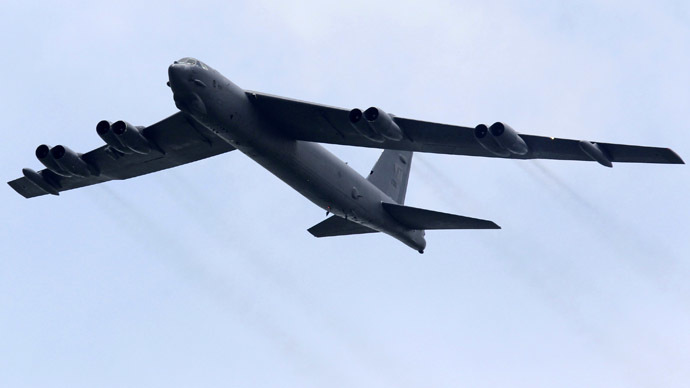The US Strategic Command, the agency responsible for country’s nuclear arsenal, will hold large-scale war games this week that will include 10 B-52 Stratofortresses and up to six B-2 Spirit bombers
The US Strategic Command, the agency responsible  for country’s nuclear arsenal, will hold large-scale war games this week that will include 10 B-52 Stratofortresses and up to six B-2 Spirit bombers, along with other military and government agencies.
for country’s nuclear arsenal, will hold large-scale war games this week that will include 10 B-52 Stratofortresses and up to six B-2 Spirit bombers, along with other military and government agencies.
The Boeing B-52 Stratofortress is a long-range, subsonic, jet-powered strategic bomber built to carry nuclear weapons.
The Northrop Grumman B-2 Spirit, also known as the Stealth Bomber, is an American strategic bomber, designed for penetrating dense anti-aircraft defenses that can drop up to sixteen 1,100 kg B83 nuclear bombs.
The exercise will be conducted from May 12-16 and is set “to deter and detect strategic attacks against the US and its allies,” the Strategic Command said in a statement.
“This exercise provides unique training opportunities to incorporate the most current technology and techniques in support of our mission. Continued focus and investment in our strategic capabilities allow US Stratcom to deter, dissuade, and defeat current and future threats to the U.S. and our allies.” said Admiral Cecil Haney, head of Strategic Command.
StratCom is the US’s nuclear command and is responsible for space operations, global strike, global missile defense; and global command, control, communications, computers, intelligence, surveillance and reconnaissance, and combating weapons of mass destruction.
Though the timing of the exercise was declared as “unrelated to real-world events,” it does come on the heels of the recent war games in Russia. Announced in November 2013, military drills on countering nuclear strikes were overseen by President Vladimir Putin ahead of the May 9 celebrations dedicated to victory in World War II
Contrary to the openness of the Russian war games, the US Strategic Command released very few details about the upcoming exercise.
Relations between Moscow and Washington have worsened significantly over the situation in Ukraine. The US continues to endorse and support a military operation by Kiev’s coup-installed government against federalization supporters in the southeast of the country.
Last week, NATO said it may permanently station additional troops in Eastern Europe as a defensive measure against Moscow. Russia views this recent buildup of NATO forces as a provocation and counterproductive in the struggle to deescalate tensions in Ukraine.
